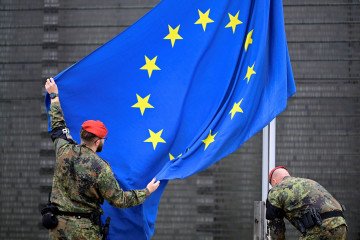Russia has published yet another list of “unfriendly countries” that do not share “traditional Russian values”—part of Moscow’s ongoing effort to retaliate against Western sanctions.
Russia approved its “unfriendly countries” list on September 20, claiming that these nations “impose destructive neoliberal ideologies that contradict Russian spiritual and moral values.”
A total of 47 countries were included, such as the U.S., the UK, Germany, and many others. Hungary and Slovakia were the only two EU states not on the list, and Turkey was the only NATO member excluded.
The list, enacted under Russian dictator Vladimir Putin’s decree, offers “approved” foreigners who share Russian values a fast track to temporary residency.
Russia has several types of “unfriendly countries” list, each imposing different restrictions on their relationships with Russia. One list imposes diplomatic limits, such as restrictions on hiring, while another enforces trade and currency measures, allowing Russia to repay creditors from these nations in rubles.
The list—officially titled Presidential Executive Order No. 243 On Measures (Countermeasures) in Response to Unfriendly Actions of Foreign States—was first passed in June 2018. Countries were first placed on the list in April 2021, and it has been updated a few times since Russia’s full-scale invasion of Ukraine in 2022.
Russia's unfriendly countries list, 2021 vs 2022 pic.twitter.com/yNaKv0EBEs
— OnlMaps (@onlmaps) January 9, 2023
Countries are added to the list when they have taken so-called “unfriendly actions towards Russian diplomatic and consular missions abroad.” The list is technically a version of Russian counter-sanctioning.
For example, when the United States was added in April 2021, the U.S. embassy was prohibited from hiring Russian employees.
Countries on the list have also seen their assets frozen or seized by Russia, in retaliation for the seizing of Russian assets abroad.
Countries added since Russia’s full-scale invasion were required to open a special bank account at a Russian bank to receive payments, reported the Association of Accredited Advocates to the European Union Public Policy (AALEP). They are not able to receive payments in any other international currency. This, Russia hopes would help inflate their economy.
Many companies pledged to leave Russia when the full-scale invasion began but ended up staying and since then, have faced financial losses. Many have stopped operating or are in the process of trying to sell their assets.
SANCTIONS limit PUTIN’s ability to fund his bloody war.
— Carol Monaghan (@CMonaghanSNP) March 18, 2022
Many companies are still trading in Russia, including:
Leroy Merlin
Danone,
Auchan,
Crédit Agricole,
Volkswagen
BMW
Mercedes
Adidas
Everyone can help.
#bloodytrade pic.twitter.com/27oYB9ygR5
In order to counter-sanction, Russia passed a decree allowing the seizure of any Russian asset owned by Western companies or their Russian subsidiaries.
European and U.S. companies have pulled out approximately 40% of their assets from Russia, though an estimated $194 billion in foreign assets remain, the Kyiv School of Economics reported.
Russia imposed a mandatory 50% discount on assets from “unfriendly” countries sold to Russian buyers, plus a 15% exit tax.
Reports suggest it’s almost impossible for Western countries to send profits made in Russia back to their headquarters. Due to the restrictions of the “unfriendly countries” list, profits must be held in special Russian accounts, known as C accounts.
“The Russian economy is experiencing colossal pressure in these conditions,” Russian Prime Minister Mikhail Mishustin claimed according to Russian state media. “The package of sanctions and restrictions is being expanded by unfriendly countries, logistical, technological, financial, and other challenges are emerging. Nevertheless, under the leadership of the President, through the coordinated efforts of the government and the Bank of Russia, we manage to counter them.”
Public outcry has grown regarding companies that chose to remain in Russia after the full-scale invasion began. Those who stayed face serious financial challenges and legal consequences.
Some companies in 2023 announced plans to leave Russia and had their assets seized.
Artem, 44—lost both legs defending Ukraine in Kherson Region—to @unilever:
— Ukraine Solidarity Project (@SolidarityUKR) July 13, 2023
Every ruble contributed to Russian Federation's budget translates into bullets that harm Ukrainians and missiles targeting cities like Kyiv, Dnipro, Zaporizhzhia, Uman, Kharkiv, and all across Ukraine. pic.twitter.com/ntbRq0sCsN
Yogurt producer Danone and beer maker Carlsberg were reportedly among those who were hit the hardest by Russia’s counter-sanctions. Danone was able to sell its Russian assets but at a very big discount, while Carlsberg remains in a legal battle with Moscow, and now the value of its Russian business is zero.
“Against this background, they look like the losers,” said Alexandra Prokopenko, a fellow at Carnegie Russia Eurasia Center in Berlin.
-46f6afa2f66d31ff3df8ea1a8f5524ec.jpg)
-0fb13e24c1098c0f28da3ab4e9ff7ec2.jpg)

-605be766de04ba3d21b67fb76a76786a.jpg)
-2c683d1619a06f3b17d6ca7dd11ad5a1.jpg)


-661026077d315e894438b00c805411f4.jpg)